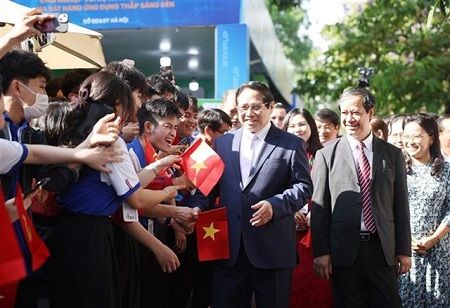-
Prime Minister Phạm Minh Chinh has urged ministries, sectors and localities to improve policies and mechanisms, specifically finance and intellectual property, to create a more favorable environment for student entrepreneurship and innovation. At the review conference on a project supporting student start-ups and opening the 7th National Start-up Festival for Students on Sunday, PM Chinh stressed that promoting youth is essential to national strength.
He characterized youth as science and technology pioneers who would spearhead Việt Nam's role in the digital age and turn Việt Nam into a regional and global innovation center. Innovation and entrepreneurship should be backed by a well-established ecosystem", the Prime Minister added, emphasizing the need to ignite a movement, establish trends, motivate and inspire young people through various mechanisms and policies. The objective is to make innovation deliver real dividends to students, their families, and society".
He explained that creating a start-up ecosystem is a long-term effort, not a short-term one. It needs complete, root solutions without being perfectionist or hasty.
In pursuit of this goal, PM Chính ordered ministries and localities to enhance policies related to finance and intellectual property, enhance public-private partnerships to support students in coming up with ideas and taking them to market, create student start-up support funds via socialised sources of funding, and build idea exchange forums and local networks of mentors.
The Prime Minister also directed the Ministry of Education and Training to keep collaborating with other agencies to set up start-up support centres, innovation spaces, incubators and accelerators in schools.
He called for integration of entrepreneurship into the formal curricula at every level of education. Schools, colleges, and universities must conduct start-up assistance policies effectively; create advanced laboratories for research and testing of products; and mobilize teachers and students to take part in applied scientific research. They were also mandated to enhance online training sites and digital resources, and add modules on innovation and entrepreneurship in academic courses.
The schools were encouraged to link up with businesses and start-up investment vehicles, establish professional mentor networks in technology and entrepreneurship and assist with intellectual property filing and product commercialisation.
"The State, the schools and companies need to cooperate more closely," Chính said.
"Companies should lead the way in placing orders, investing and following students through from practice and internships through to commercialisation of ideas. They need to work with the schools to encourage and guide the next generation.
The government chief also invited the Hồ Chí Minh Communist Youth Union to extend its 'Youth Start-up' programme, targeting four priority sectors: information technology and cybersecurity, medical and educational technology, environmental and energy technology and high-tech agriculture.
Within the ambit of the 'Student Start-up Support Project' (Project 1665) undertaken between 2020 and 2024, student entrepreneurship in Việt Nam has witnessed phenomenal progress. Over the period, students across the country have initiated close to 39,000 start-up projects, while middle school and high school students have accounted for almost 9,000 projects.
Most importantly, since 2020, close to 300 start-ups have been established based on incubation programmes in higher education institutions.
Nationwide, over 2,000 lecturers and nearly 10,000 students have been awarded and recognized by their institutions for excellent performances in entrepreneurship activities.
The 2025 National Start-up Festival for Students is co-organised by the Ministry of Education and Training, the Hồ Chí Minh Communist Youth Union, and the People's Committee of HCM City.
Beginning on Friday, the event also featured a number of prominent seminars on innovative solutions to promote innovation in higher education institutions, assisting start-ups in vocational education during the digital economy era, promoting entrepreneurial mindset among students through career guidance and inspiring start-up stories from young entrepreneurs.
A highlight of the event is the Grand Finale and Award Ceremony of the 7th 'Students with Start-up Ideas' Competition, which has emerged as a highly respected platform for young entrepreneurs. This year's competition saw a total of 775 project submissions from students in universities, vocational schools and high schools around the country. Of these, the Ministry of Education and Training shortlisted 125 outstanding projects to compete in the final round.
The entries are impressive for their diversity and caliber, with most ideas geared towards addressing actual social and community issues. Projects from university students especially impressed with their adoption of latest technologies, including IoT, Big Data and AI. A number of such projects have already been executed with early success, moving into profitable phases and exhibiting growth paths.
🍪 Do you like Cookies?
We use cookies to ensure you get the best experience on our website. Read more...

